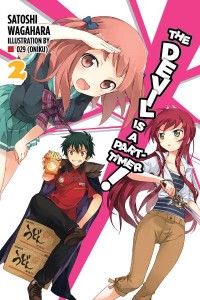By Satoshi Wagahara and 029. Released in Japan by ASCII Mediaworks. Released in North America by Yen Press.
The second volume of this series does what is expected of it. It expands on the themes and characters of the first book, adds a new villain and a new sort-of heroine, and relies on its comedy and its action scenes to carry it through. Luckily, the writing style is excellent, so this works pretty well. Out of all of Yen’s recent releases, this is one of the most smoothly translated. It also flies by, even though it’s easily the longest book to come out in August by a good 40-50 pages. We’re dealing with fallout from the first book, as back in Enta Isla, the fantasy world our hero and heroine came from, political machinations war with religious purpose in order to find out how to deal with what’s happened. This results in a literal Inquisitor being sent to deal with Maou.
As with A Certain Magical Index, those of a religious inclination might take offense at some of the things this series has to say about the Church, which is portrayed as rather Machiavellian in nature. Suzuno is meant to be of a purer, more moral type, but that doesn’t mean she has not killed people in order to properly serve the church. And, like Emi in the first book, she’s disturbed and distrusting whenever she sees Maou not being evil. In fact, Emi continues to be disturbed by this, and her pursuit of Maou has drizzled down into a sort of “OK, I guess I’ll go stalk him now” duty. Again, I really wonder what sort of horrible things Maou personally did (as opposed to having other evil people doing things for him) in Enta Isla – Chiho speaks for the reader when she says that she can’t judge him based on things she hasn’t experienced.
The main reason to read the series continues to be the comedy, which remains excellent. The narrative voice gets in several cutting remarks as well, without sounding intrusive. There are the standard anime gags – both Emi and Suzuno are annoyed at being flat-chested in comparison to Chiho, and it comes up several times – but there’s also genuine character-based humor. I was especially amused at everyone’s treatment of Urushihara, whose tendency to have everyone think the worst of him is matched only by actually being the worst most of the time. Chiho’s straightforwardness is also refreshing, as she’s straight up admitted she’s in love with Maou, and said so to his face. This does not resolve anything, really – for all the sexual desire he’s shown in the series so far, Maou could be asexual – but it’s still nice to see.
There were a few things that annoyed me towards the end. Sariel is meant to be a gross villain, but the series really goes above and beyond, making him a wannabe rapist who sexually assaults Emi and has delusions of taking Chiho back to Enta Isla as his bride. Maou seems to imply these tendencies were known about Sariel even back in Enta Isla, which is also horrible. The fact that he’s allowed to stay as comic relief (rather than. say, end up in prison, as Olba did) irks me. Still, overall this was another very strong addition to the series, which manages to combine fantasy, humor, and slice-of-life in ways that make the pages fly by.


Speak Your Mind